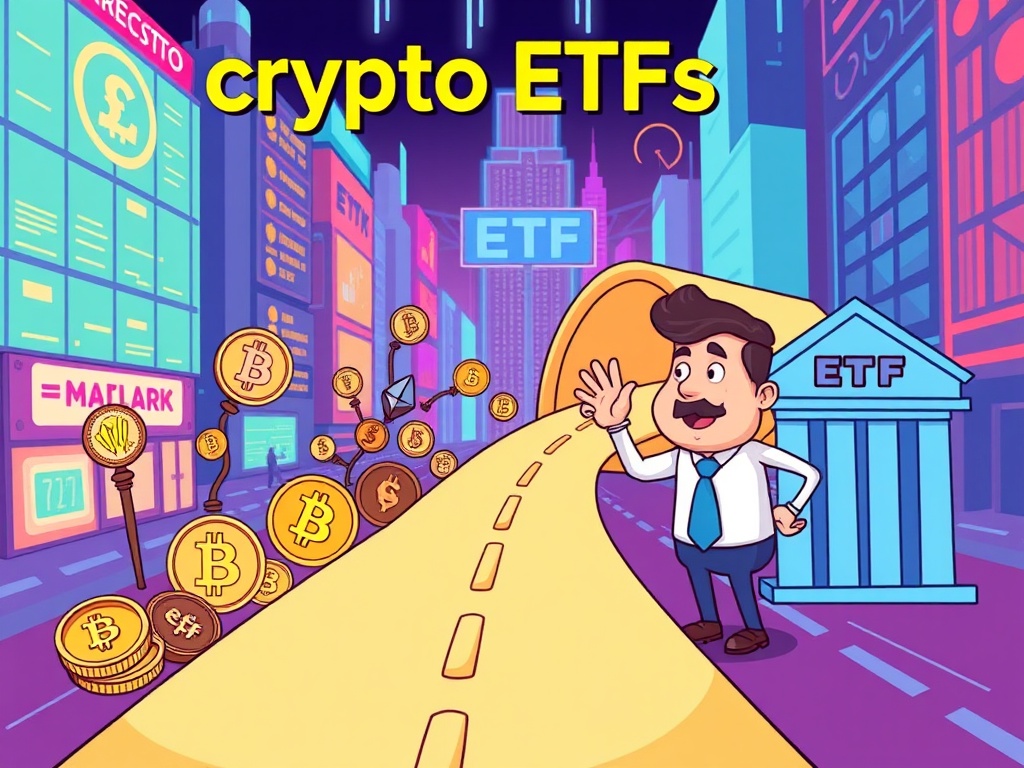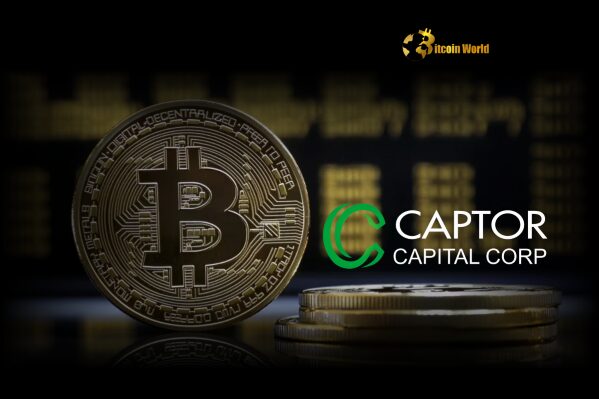BitcoinWorld

Crypto ETF: Unlocking Revolutionary Speed for Digital Asset Listings
The world of digital assets is constantly evolving, and with it, the demand for more accessible and regulated investment vehicles. For years, investors have eagerly awaited clearer pathways to participate in the cryptocurrency market without directly owning the underlying assets. Enter the crypto ETF – a powerful bridge between traditional finance and the innovative realm of digital currencies.
However, the journey to getting a crypto ETF listed on major exchanges has historically been fraught with regulatory hurdles, lengthy reviews, and often, outright rejections. But what if that process could be dramatically simplified? This is precisely what two major securities exchanges, Cboe BZX Exchange and NYSE Arca, are proposing to the U.S. Securities and Exchange Commission (SEC), potentially ushering in a new era of faster, more efficient digital asset listings.
What’s the Buzz Around Crypto ETF Simplification?
At the heart of the current regulatory framework for new financial products, including exchange-traded funds (ETFs), lies the SEC’s rule change filing process, specifically the 19b-4 form. This form requires exchanges to submit detailed proposals for any new product or rule modification, which then undergoes a thorough and often protracted review by the SEC. For crypto ETF listings, this has meant a significant bottleneck, with each new proposal facing intense scrutiny and lengthy waiting periods.
The joint proposal by Cboe BZX and NYSE Arca seeks to revolutionize this cumbersome process. Instead of requiring a full 19b-4 review for every single crypto ETF that wants to list, their amendment aims to create an expedited pathway. Here’s a breakdown of the proposed changes:
- Elimination of Redundant Reviews: The core of the proposal is to remove the need for individual 19b-4 rule change filings for ETFs that meet specific, pre-defined requirements. This means that once a certain standard is set and met, subsequent ETFs wouldn’t need to go through the entire, arduous approval process again.
- Automatic Listing: ETFs that comply with these established criteria would be automatically listed and traded. This ‘auto-listing’ mechanism is a game-changer, moving away from the current discretionary, case-by-case approvals that have often led to delays and uncertainty.
- Focus on Existing ETFs: While the proposal aims to streamline the process for new listings, it specifically targets ETFs that meet existing, yet-to-be-defined, requirements. This suggests a focus on creating a framework for products that are already understood or have precedent, rather than entirely novel structures.
This initiative represents a significant push from within the traditional finance sector to adapt regulatory frameworks to the speed and innovation of the digital asset space. It signals a desire for more predictability and efficiency in bringing new crypto ETF products to market.
Why are Crypto ETF Listings So Important?
The clamor for crypto ETF products isn’t just about financial innovation; it’s about accessibility, legitimacy, and the maturation of the digital asset market. Here’s why these listings hold such immense importance:
1. Bridging the Gap for Retail Investors:
- Ease of Access: Many retail investors are comfortable with traditional brokerage accounts but find the process of setting up crypto wallets, managing private keys, and navigating various exchanges daunting. A crypto ETF allows them to gain exposure to digital assets directly through their existing investment platforms.
- Simpler Management: Investors don’t have to worry about the complexities of self-custody, security breaches on crypto exchanges, or understanding blockchain technology. The ETF structure handles these operational aspects.
2. Attracting Institutional Capital:
- Regulatory Comfort: Institutional investors, such as pension funds, endowments, and wealth managers, often operate under strict mandates that prevent them from directly holding volatile, unregulated assets. A regulated crypto ETF provides a compliant vehicle for them to enter the market.
- Diversification and Liquidity: ETFs offer a familiar, liquid, and regulated way for institutions to diversify their portfolios and gain exposure to a new asset class without the operational complexities.
3. Enhancing Market Legitimacy and Maturity:
- Regulatory Oversight: When a crypto ETF is approved and listed, it inherently brings a layer of regulatory oversight, transparency, and investor protection that is often lacking in direct crypto investments.
- Price Discovery: Increased institutional participation and broader market access can lead to more efficient price discovery and potentially reduce volatility in the underlying crypto assets.
4. Portfolio Diversification:
- New Asset Class Exposure: Cryptocurrencies, while volatile, offer a unique risk-reward profile that can act as a diversifier in a traditional investment portfolio, potentially offering uncorrelated returns.
The ability to list crypto ETF products more efficiently is not merely a procedural change; it’s a foundational step towards integrating digital assets more deeply into the global financial system, opening doors for a broader spectrum of investors.
Potential Hurdles: Navigating the Path for Crypto ETF Approvals
While the proposal from Cboe BZX and NYSE Arca is a significant step forward, it’s crucial to acknowledge the historical challenges and the SEC’s persistent concerns regarding crypto ETF approvals. The path to broader adoption is rarely without obstacles.
The SEC has, for years, expressed reservations about spot crypto ETFs (those that directly hold the underlying cryptocurrency, like Bitcoin). Their primary concerns have revolved around:
- Market Manipulation: The SEC has often cited concerns about the potential for manipulation in unregulated cryptocurrency markets, arguing that these markets lack the surveillance and integrity present in traditional financial markets. This makes it difficult to ensure fair valuation and protect investors.
- Investor Protection: Ensuring adequate investor protection is paramount for the SEC. They worry about the high volatility of cryptocurrencies, the potential for fraud, and the lack of robust regulatory frameworks in some crypto trading venues.
- Custody and Valuation: Secure custody of digital assets and reliable methods for valuing them have also been points of contention. Unlike traditional assets, crypto assets have unique storage and security requirements.
The current proposal, by focusing on streamlining the listing process for ETFs that meet certain requirements, implicitly suggests that some of these concerns might be addressed through the underlying structure of the ETFs themselves or through evolving market conditions. For instance, the approval of Bitcoin futures ETFs indicated a level of comfort with regulated derivatives markets, paving the way for further discussions.
However, the SEC will still need to define what those ‘certain requirements’ are for automatic listing. This definition will be critical and will likely be the next battleground for advocates of accelerated crypto ETF approvals. The balance between fostering innovation and safeguarding investors remains a delicate one for regulators.
What Does This Mean for the Future of Crypto ETF Investment?
Should the SEC approve the proposed regulatory amendment, the implications for the future of crypto ETF investment could be profound and far-reaching. This shift could accelerate the mainstream adoption of digital assets and transform how investors interact with the crypto market.
Here’s what we might expect:
- Increased Product Variety: A simplified listing process could pave the way for a broader range of crypto ETF products. Beyond Bitcoin and Ethereum, we might see ETFs tracking baskets of altcoins, specific blockchain sectors (e.g., DeFi, NFTs), or even inverse and leveraged crypto ETFs, catering to diverse investment strategies. This would significantly expand the options available to both retail and institutional investors looking for specific exposure within the digital asset ecosystem.
- Enhanced Market Liquidity and Efficiency: Easier access through ETFs could attract more capital into the crypto market, leading to increased liquidity. Higher liquidity often translates to tighter bid-ask spreads, better price discovery, and reduced volatility, making the market more attractive and efficient for all participants.
- Greater Institutional Participation: With a clearer, more predictable regulatory path, more traditional financial institutions may feel comfortable launching and investing in crypto ETFs. This influx of institutional capital could further legitimize the crypto market, drive innovation in financial products, and potentially lead to more stable growth.
- Potential for Lower Fees: As competition increases with more ETFs entering the market, issuers might be incentivized to offer lower management fees to attract investors. This would benefit investors by reducing the cost of gaining crypto exposure.
- Wider Investor Base: The simplicity and familiarity of the ETF structure will undoubtedly appeal to a larger segment of the investing public who have been hesitant to engage directly with cryptocurrencies due to perceived complexity or risk. This could lead to a significant expansion of the overall crypto investor base.
While the full impact will depend on the specifics of the SEC’s final decision and the criteria for automatic listing, this proposal represents a critical step towards a more integrated and accessible future for crypto ETFs in the global financial landscape. It’s a testament to the growing acceptance and maturation of digital assets as a legitimate asset class.
A Revolutionary Leap for Crypto ETFs
The joint proposal from Cboe BZX and NYSE Arca to simplify regulations for crypto ETF listings marks a potentially revolutionary moment for the digital asset space. By seeking to streamline the arduous 19b-4 review process, these exchanges are pushing for a future where qualified ETFs can be listed and traded with unprecedented speed and efficiency. This isn’t just about cutting red tape; it’s about unlocking broader access for investors, attracting significant institutional capital, and further legitimizing cryptocurrencies as a mature asset class. While the SEC’s ultimate decision and the specifics of any approved framework remain to be seen, this initiative signals a powerful shift towards a more integrated and accessible financial ecosystem where the innovation of digital assets can truly thrive. The journey to a fully realized crypto ETF market is ongoing, but this proposal offers a compelling vision of an accelerated, more predictable path forward.
Frequently Asked Questions (FAQs)
What is a Crypto ETF?
A crypto ETF, or Exchange-Traded Fund, is an investment fund that holds cryptocurrencies or assets related to them (like futures contracts) and trades on traditional stock exchanges. It allows investors to gain exposure to the price movements of cryptocurrencies without directly buying and holding the digital assets themselves.
What is the SEC’s 19b-4 Rule Change Filing?
The 19b-4 rule change filing is a formal proposal submitted by a securities exchange (like Cboe BZX or NYSE Arca) to the U.S. Securities and Exchange Commission (SEC) to modify its rules or list new products, such as ETFs. The SEC reviews these filings to ensure they comply with securities laws and protect investors, a process that can often be lengthy and complex.
How Does This Proposal Differ from Past Crypto ETF Approvals?
Previous crypto ETF approvals, especially for Bitcoin futures ETFs, involved individual, extensive 19b-4 reviews for each product. This new proposal aims to create a framework for automatic listing for certain ETFs that meet predefined requirements, effectively eliminating the need for a separate, lengthy review for every compliant ETF, thereby speeding up the process significantly.
Will This Proposal Lead to More Spot Crypto ETFs?
While the proposal focuses on streamlining the listing process generally, its approval could indirectly pave the way for more spot crypto ETFs. By establishing clear criteria for automatic listing, it might provide a clearer path for future spot products, provided they can meet the SEC’s underlying concerns regarding market integrity and investor protection.
What are the Potential Benefits for Investors if This Proposal is Approved?
If approved, investors could benefit from faster access to a wider variety of crypto ETF products, potentially lower management fees due to increased competition, and the convenience of investing in cryptocurrencies through their existing brokerage accounts with enhanced regulatory oversight and investor protection.
If you found this article insightful, consider sharing it with your network! Help us spread awareness about the evolving landscape of crypto ETFs and how regulatory changes are shaping the future of digital asset investment.
To learn more about the latest crypto market trends, explore our article on key developments shaping Bitcoin institutional adoption.
This post Crypto ETF: Unlocking Revolutionary Speed for Digital Asset Listings first appeared on BitcoinWorld and is written by Editorial Team





